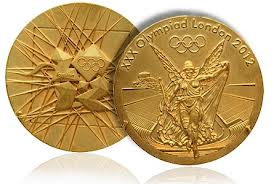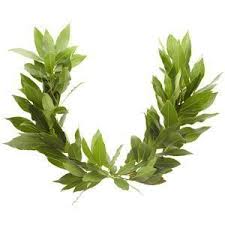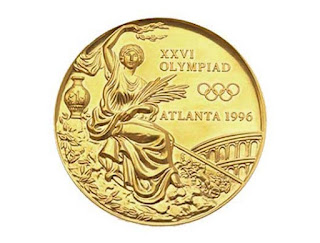To An Athlete Dying Young - Literature Notes
Please note that the information given on this poem is not meant to replace any material given in the classroom setting. It is a very BASIC giude to enable a literal understanding of the poem. Metaphorical interpretations should be sought in the classroom.
|
The physical structure of this poem has been altered from the original layout in the text. 1.The time you won your town the race 2.We chaired you through the market place; Man and boy stood cheering by, and 3.home we brought you shoulder-high. Today, the road all runners come, 3.Shoulder-high we bring you home, And set you at your threshold down, Townsman of a 4.stiller town. 7.Smart lad, to slip betimes away from fields where glory does not stay 5.And early though the laurel grows It withers quicker than the rose. Eyes the 4.shady night has shut Cannot see the record cut, And 6.silence sounds no worse than cheers 8.After earth has stopped the ears: Now you will not swell the 9.rout Of lads that 10.wore their honours out Runners whom renown outran And the name died before the man 1.So set, before its echoes fade The fleet foot on the sill of shade And hold to the low 11.lintel up The still defended challenge cup. And round that 12.early laurelled head Will flock to gaze the strengthless dead 13.And find unwithered on its curls The garland briefer than a girl's. Housman A. E. 'To An Athlete Dying Young' in A World of Prose. Edited by Mark McWatt and Hazel Simmonds McDonald. Pearson Education Ltd, 2005. |
This is the OPINION of one individual, which might not coincide with the views of others. The persona is recalling the fact that an athlete, who was a fellow townsman, won a race for their town. As a result, the athlete was cheered by the townspeople and brought home on their shoulders. The persona then takes the poem into the present by making the reader/ audience aware that the athlete is now dead. The third stanza reveals the persona's views on the death of the athlete. He believes that the athlete was smart to die. This is the case because he has left a world where glory is fleeting. The persona goes on to explain that if a person is dead, they cannot see their record broken. He believes that the athlete is lucky because he will not be one of the many athletes who have worn their honours out, and have been beaten. The persona is basically pointing out that if you die young, in the midst of your success, you will not see your record, or the standard that you have set, broken. LITERARY DEVICES
1. ALLITERATION
|
slow down to pronounce each 't'. It is almost as if the persona is about to tell us, the
audience, a story.
- Stanza 6, lines 21-22: This device emphasizes the major point of this poem; that glory is fleeting, therefore, the persona is lucky that he is no longer in the race. He has set his 'fleet foot', or speedy legs, at death's door. The interesting repetition of two different consonants first draws the reader's eye, then the words emphasize the main point of the poem.
2. PUN
The pun is placed on the word 'chaired' and 'cheering'. The first word implies that the athlete was carried on the shoulders of the townsfolk, while the second word, implies that the athlete was applauded by the inhabitants of the town. Both words carry the implication that people of the town were pleased with the athlete's performance.
3. REPETITION
The repetition of this particular phrase highlights the fact hat, whether in life or death, the athlete was respected.
4. EUPHEMISM
- Stanza 2, line 8: The term 'stiller town' is used to replace the word cemetery. It is a term that softens the tone of the poem.
- Stanza 4, line: 13: The term 'shady night' is used to replace the harsher word 'death'. It too softens the tone of the poem.
5. SIMILE
A laurel is literally a plant with dark, green glossy leaves. This plant was worn on the head as an emblem of victory, or a mark of honour, in classical times. This plant is compared to the rose because it is said, according to the persona, to wither faster. On a figurative level, this could be interpreted as meaning that victory, as represented by the laurel, does not last.
6. OXYMORON
The contrast exists between silence being given a sound. This immediately draws the reader/ audience's attention, which, in turn, purposefully highlights the main theme of the poem; it is better to die before one witnesses their record cut. Silence is no worse than cheers when one can hear neither of them.
IMPORTANT WORDS/ PHRASES
7.'smart lad, to slip betimes away from fields where glory does not stay'
The persona believes that the athlete is smart to die before his record was shattered by some-one else.
8.'after earth has stopped the ears'
Earth, in this context, literally means the dirt that covers a coffin. Therefore, the athlete can hear neither silence nor cheers when his coffin is enclosed by dirt.
9.'rout'
This word literally means an overwhelming defeat. The persona is, therefore, saying that the athlete will not become a part of the group of athletes that are defeated if he dies before his record is broken.
10.'wore their honours out'
This line refers to the fact that when an athlete outlives his record, he is no longer placed on a pedestal and adored. He has, therefore, worn his honours out.
11.'lintel'
This word is defined as a horizontal architectural member supporting the weight of an opening (window or door). In this context, the lintel is the supporting structure above the coffin and the persona is holding it up. This implies that the athlete will remain victorious in death.
12.'early laurelled head'
This line means that the athlete was victorious in his youth.
13.'and find unwithered on its curls the garland briefer than a girl's'
The dead will find that the athlete is still victorious, even in death. Therefore, the laurel, which signifies success and victory, will be fresh and unwithered on the athlete's head.
MOOD/ ATMOSPHERE
The mood of the poem is reflective.
TONE
The tone of the poem is reflective.
THEMATIC CATEGORIZATION
Death, sports
Contributor: Leisa Samuels-Thomas
The mood of the poem is reflective.
TONE
The tone of the poem is reflective.
THEMATIC CATEGORIZATION
Death, sports
Contributor: Leisa Samuels-Thomas






